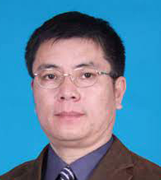
Prof. Ming Xie
Nanyang Technological University, Singapore
Associate Editor of IEEE Transaction on Autonomous Mental Development
Xie Ming is holding the positions of Associate Professor at Nanyang Technological University, Editor-in-Chief of International Journal of Humanoid Robotics (Indexed by SCI/SCIE), Associate Editor of IEEE Transaction on Autonomous Mental Development, and Director of private companies. He has served as technical consultants to Asia Electronics Pte Ltd in 1994, Port of Singapore Authority in 1994, Delphi Automotive Systems Pte Ltd in 2001, ST Aerospace Ltd in 2006, Murata Electronics Pte Ltd in 2007, and Sony Electronics Pte Ltd in 2007. He has also worked with Renault Automation (Paris/France) in 1986, INRIA Sophia-Antipolis (Nice/France) between 1990 and 1993, and Singapore-MIT Alliance between 2000 and 2004. In addition, Xie Ming has served as the General Chair of International Conference on Climbing and Walking Robots in 2007, and International Conference on Intelligent Robotics and Applications in 2009. Xie Ming obtained his B.Eng in control and automation in 1984. At the same year, he was selected as one of Chinese government’s overseas scholars. Thereafter, he obtained the Master degree in industrial automation from the University of Valenciennes (France) in 1986, and the Ph.D degree in informatics from the University of Rennes (France) in 1989. He has published one best-selling book in robotics in 2003, and over 100 research papers so far. Xie Ming has taught a number of university courses such as Applied Machine Vision, Robotics, Computer Graphics, Statistical Process Control, and Physics. Xie Ming’s research strengths are in machine intelligence, humanoid robotics and autonomous vehicles. In total, he has won two scientific competition awards, and two best conference paper awards.
Speech Title: Science of Mind as New Foundation of Artificial Intelligence
Abstract: Does intelligence arise from brain or mind? This is a dilemma in 21th century. The wrong answer to this question will certainly lead the research efforts into the wrong direction. In this keynote speech, I will share with the audience the astonishing fact which supports the claim that intelligence arises from mind, but not from brain. This truth helps us to open the door toward establishing the Science of Mind which will be the New Foundation of Artificial Intelligence. I will first go through the history of Artificial Intelligence, in which AI 1.0 was primarily focused on machine thinking while AI 2.0 was intensively focused on machine learning. Then, I will outline some extremely important findings about: 1) why AI 1.0 and AI 2.0 are not the foundation of AI, and 2) why AI 3.0, which is a framework toward achieving machine's self-intelligence, should be the authentic foundation of AI. More details of our research findings could be found inside the published book: "Xie M., Chen H. and Hu Z. C., (2021), New Foundation of Artificial Intelligence, World Scientific Publishing Co., 404pp".

Prof. Hirozumi Yamaguchi
Osaka University, Japan
Hirozumi Yamaguchi is a full professor at The University of Osaka (Osaka University), where he leads the Mobile Computing Laboratory. He received his Ph.D. in Engineering from Osaka University in 1998. His research focuses on cyber-physical systems, mobile and pervasive computing, particularly in smart cities and smart living. He has led several national projects, including JST CREST and NICT, and serves in editorial roles for reputable journals such as Elsevier Ad Hoc Networks and Elsevier Pervasive and Mobile Computing, as well as a chair/member for major wireless and mobile IEEE conferences such as IEEE PerCom, WoWMoM, MASS, and SmartComp. He has also served as General Chair for international conferences including EAI Mobiquitous and ICDCN. He received the Minister of Education's Commendation for Science and Technology in 2018 and is an IEEE Senior Member. Since April 2024, he has also headed the Large-Scale Digital Twin Research Team at RIKEN Center for Computational Science (R-CCS) as the team principal.
Speech Title: Modeling and Simulation of Distributed Phased-Array Communication Using Formation-Flying Small Satellites
Abstract: This talk introduces recent advances in simulating large-scale formation flying of ultra-small satellites to enable next-generation non-terrestrial communication systems. Dense swarms oPicoSats can function as a virtual large-aperture phased-array antenna, offering the potential for high-gain, direct-to-device connectivity by coordinating thousands of satellites with centimeter-level relative positioning. Building on our studies of distributed beamforming performance and array geometry optimization, as well as the development of a unified simulation framework that integrates high-fidelity orbital dynamics, sensor-error modeling, and electromagnetic interaction among up to 100,000 spacecraft, we discuss the key technical challenges and emerging simulation methodologies that pave the way for practical deployment of satellite-swarm-based communication architectures.
Copyright © ICNGN 2025




